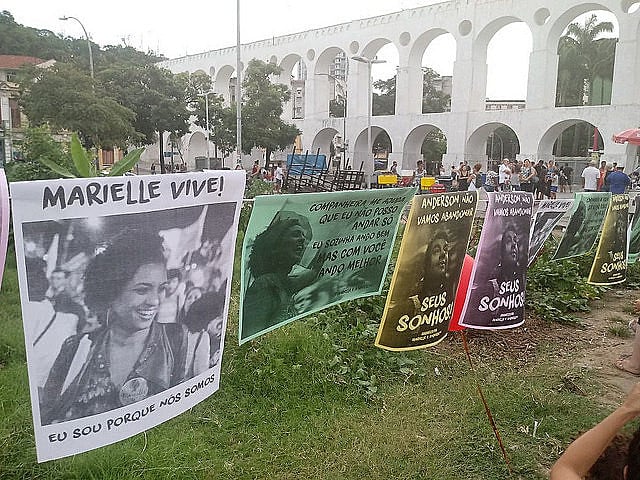About 10,000 people marched in the city of Rio de Janeiro on Saturday, one month after the brutal murder of Brazilian human rights activist and councilwoman Marielle Franco and her driver Anderson Gomes.
The police still have no answers about the people responsible for the shooting. Around the world, dozens of demonstrations were reported on the 14th in at least three continents — the Americas, Europe, and Africa — to protest and remember the murder of Franco and Gomes.
A collaborative map organized by Franco’s office staff (see below) reported demonstrations in 15 countries. In Brazil, there were activities in at least 16 states. In Rio de Janeiro, Franco’s hometown, where she was murdered, 45 protests took place in all parts of the city.
In Rio, one demonstration retraced Franco’s last route at the night of her murder, when she participated in an event about young black women’s struggle and was being driven back home when shooters attacked the car she was in and killed her and her driver Anderson Gomes.
The protest ended at the crime scene, where demonstrators projected messages, sang chants against police brutality and the federal intervention in Rio, held a moment of silence, and delivered a symbolic performance. They also placed flowers, candles, and other objects to honor the victims at the scene.
“It’s very symbolic to have people gathered here to retrace this route, to show that it’s been a month and we still haven’t got justice for Marielle and Anderson. We are here on the street to show we are resisting for her. We are Marielle’s seeds and we will keep growing stronger and stronger,” said councilman David Miranda, a fellow member of Franco’s Socialism and Liberty Party (Partido Socialismo e Liberdade – PSOL).
Miranda said he trusts the investigations that are being conducted by people who knew Franco back from when she worked as an advisor to Rio de Janeiro state congressman Marcelo Freixo. But he highlighted that people keep pressuring for answers, in Brazil and other countries. The international campaign Justice for Marielle, led by Miranda, is already supported by important figures such as Edward Snowden, Noam Chomsky, and Naomi Klein, as well as members of the Black Lives Matter movement, of the American congress, and of the German and English parliaments. The main theory is that she was executed by militiamen for denouncing the involvement of police officers in the death of young black men in the Rio’s poorest areas.
Poet Letícia Brito, who organizes the all-female rap slam battle Slam das Minas, also participated in the march and translated what fellow rappers were feeling into words. “Marielle was a black representative from the outskirts, from the favela [slums]. She was a very important voice for us in the City Council. Marielle supported the slam battle. We’ve actually held events with Marielle, and our poetry is very political. So Marielle was a leader we had. We’ve lost that, and we want justice,” she said.
Congresswoman Jandira Feghali highlighted that last Saturday’s march was very important to bring comfort to the victims’ families and to do Franco’s legacy justice. “One month after [the murders], people are still taking to the streets. I think this goes to show society that death does not really mean death. You relive the process, the very route that is retraced, giving it new meaning, so that the struggle continues,” Feghali stated.
Around the World
Click the links below to see photos of the demonstrations for Franco and Gomes around the world:
Rio de Janeiro




